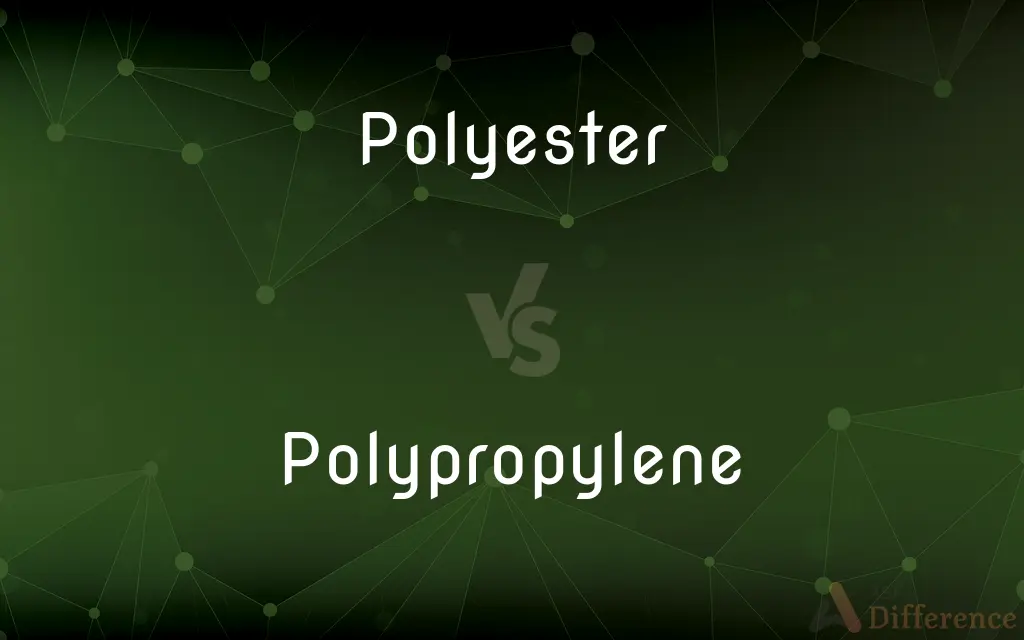Polyester vs. Polypropylene — What's the Difference?
Edited by Tayyaba Rehman — By Fiza Rafique — Updated on October 13, 2023
Polyester is a durable synthetic fiber used in textiles. Polypropylene is a thermoplastic polymer used in packaging and textiles. Both are synthetic, but they have different properties and applications.

Difference Between Polyester and Polypropylene
Table of Contents
ADVERTISEMENT
Key Differences
Polyester is a synthetic fiber derived from coal, air, water, and petroleum. Polypropylene, on the other hand, is a thermoplastic polymer made from the monomer propylene. Both materials are used in a variety of applications, but their chemical compositions and properties differ significantly.
Polyester is commonly used in clothing, bedding, and other textile applications due to its strength, durability, and resistance to most chemicals. Polypropylene, while also used in textiles like ropes and carpets, is more commonly found in packaging, containers, and other molded materials.
In terms of environmental impact, Polyester can take centuries to decompose, which has raised environmental concerns. Polypropylene, while also non-biodegradable, can be recycled more easily than polyester, giving it an edge in terms of sustainability.
When exposed to heat, Polyester can melt but doesn't shrink, making it suitable for ironing in some cases. Polypropylene has a lower melting point and can warp or melt at temperatures that polyester can withstand.
In terms of feel and texture, Polyester often has a smoother finish, making it preferable for clothing. Polypropylene tends to be more rugged, which is why it's a popular choice for heavy-duty applications like industrial containers.
ADVERTISEMENT
Comparison Chart
Origin
Derived from coal, air, water, and petroleum.
Made from the monomer propylene.
Common Uses
Clothing, bedding, textiles.
Packaging, containers, ropes, carpets.
Decomposition
Takes centuries to decompose.
Non-biodegradable but more recyclable than polyester.
Reaction to Heat
Can melt but doesn't shrink easily.
Lower melting point; warps or melts more easily.
Texture
Smoother finish, suitable for clothing.
Rugged, suitable for heavy-duty applications.
Compare with Definitions
Polyester
A synthetic fiber used mainly in textiles.
She bought a polyester blouse because it was wrinkle-resistant.
Polypropylene
A material made from the monomer propylene.
The carpet is made of polypropylene, which is stain-resistant.
Polyester
A material derived from petroleum used in fabrics and plastics.
The tent is made of durable polyester, ensuring it lasts for years.
Polypropylene
A versatile thermoplastic polymer used in various products.
The storage container is made of polypropylene, making it durable.
Polyester
A long-chain synthetic polymer containing the ester functional group.
The chemistry class studied the molecular structure of polyester.
Polypropylene
A common plastic used in packaging and household items.
The kitchen utensils are crafted from polypropylene for long-lasting use.
Polyester
Polyester is a category of polymers that contain the ester functional group in every repeat unit of their main chain. As a specific material, it most commonly refers to a type called polyethylene terephthalate (PET).
Polypropylene
A recyclable polymer with a high melting point.
Because of its high melting point, polypropylene is ideal for microwave-safe containers.
Polyester
A synthetic resin in which the polymer units are linked by ester groups, used chiefly to make synthetic textile fibres.
Polypropylene
Polypropylene (PP), also known as polypropene, is a thermoplastic polymer used in a wide variety of applications. It is produced via chain-growth polymerization from the monomer propylene.
Polyester
Any of numerous synthetic polymers produced chiefly by reaction of dicarboxylic acids with dihydric alcohols and used primarily as light, strong, weather-resistant resins in boat hulls, textile fibers, adhesives, and molded parts.
Polypropylene
A synthetic resin which is a polymer of propylene, used chiefly for films, fibres, or moulding materials
High-impact polypropylene
Polypropylene underwear
Polyester
A wrinkle-resistant fabric of fibers made from any of these resins.
Polypropylene
Any of various thermoplastic polymers of propylene. They are hard and tough, and are used to make molded articles and fibers.
Polyester
Any polymer whose monomers are linked together by ester bonds
Polypropylene
A fabric of fibers made from any of these polymers.
Polyester
A material or fabric made from polyester polymer
Polypropylene
A thermoplastic resin made by the polymerization of propylene, and used for films, fibres, or moulding materials. Also known as polypropene.
Polyester
Of, or consisting of polyesters
Polypropylene
A polymer of propylene used as a thermoplastic molding material
Polyester
Any of numerous synthetic resins; they are light and strong and weather resistant
Polypropylene
A lightweight, chemically resistant plastic.
The chemical lab uses polypropylene beakers due to their resistance to many solvents.
Polyester
A complex ester used for making fibers or resins or plastics or as a plasticizer
Polyester
Any of a large class of synthetic fabrics
Polyester
A polymer used to make PET bottles and other packaging.
The recycled polyester from PET bottles is turned into clothing fabrics.
Polyester
A fabric resistant to wrinkles, shrinking, and chemicals.
I prefer polyester bedsheets because they're easy to maintain.
Common Curiosities
What is polyester made from?
Polyester is derived from coal, air, water, and petroleum.
Is polypropylene safe for food storage?
Yes, polypropylene is commonly used in food containers due to its chemical resistance.
Are polyester fabrics breathable?
Polyester is less breathable than natural fibers, making it warmer in hot conditions.
Does polyester shrink when washed?
Polyester is generally resistant to shrinking, but it's best to check care labels.
Why is polyester popular in clothing?
Polyester is durable, wrinkle-resistant, and often more affordable than natural fibers.
Is polypropylene a type of plastic?
Yes, polypropylene is a thermoplastic polymer.
Is polyester good for outdoor wear?
Polyester is often used in outdoor wear due to its durability and moisture-wicking properties.
How is polypropylene produced?
Polypropylene is produced through the polymerization of the monomer propylene.
Are polypropylene products microwave safe?
Many polypropylene products are microwave safe, but always check the manufacturer's guidelines.
What's the melting point of polypropylene?
Polypropylene has a melting point of approximately 320°F (160°C).
Can polypropylene be recycled?
Yes, polypropylene is recyclable and often has the recycling symbol "PP" with the number "5" inside it.
Can polyester be dyed easily?
Polyester can be dyed, but it requires disperse dyes and is not as straightforward as dyeing natural fibers.
Which is more environmentally friendly, polyester or polypropylene?
Both have environmental impacts, but polypropylene is more easily recycled than polyester.
Is polypropylene UV resistant?
Polypropylene can degrade with prolonged UV exposure, but it can be treated for better UV resistance.
How long does polyester take to decompose?
Polyester can take several centuries to fully decompose.
Share Your Discovery

Previous Comparison
Deal vs. Steal
Next Comparison
AAS vs. AESAuthor Spotlight
Written by
Fiza RafiqueFiza Rafique is a skilled content writer at AskDifference.com, where she meticulously refines and enhances written pieces. Drawing from her vast editorial expertise, Fiza ensures clarity, accuracy, and precision in every article. Passionate about language, she continually seeks to elevate the quality of content for readers worldwide.
Edited by
Tayyaba RehmanTayyaba Rehman is a distinguished writer, currently serving as a primary contributor to askdifference.com. As a researcher in semantics and etymology, Tayyaba's passion for the complexity of languages and their distinctions has found a perfect home on the platform. Tayyaba delves into the intricacies of language, distinguishing between commonly confused words and phrases, thereby providing clarity for readers worldwide.
















































